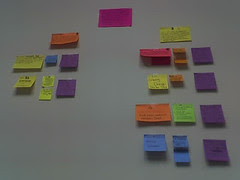
I KNOW THAT MANY OF US, MYSELF INCLUDED, ARE LOOKING for ways to encourage and maybe even inspire boards to take an active role in their own leadership and decision-making growth. It's not easy.
That's why I thought the following from Hildy Gottlieb, President of the Community-Driven Institute, in response to a question on LinkedIn about board learning was one I wanted to share with you. Hildy's suggestions for creating a board learning environment can be used by organizations of any size, with staff or not.
So, go for it!
I have been encouraging boards to actually begin doing their work as learning communities - with generative discussion being a big part of each meeting, focused on the things that matter most - vision, values, making a difference, measuring that difference.
Focusing on the "intentional" part of your question, some strategies I've seen work well.
• Have the generative discussion be the first item on the agenda, to set the tone for the rest of the meeting (and to not get lost in the shuffle)
• Have the vision and values of the org handed out to every board member at every meeting (yes mission is important, but not as important as vision for the change they want to create, and the values by which they will do their work)
• Routinely have an agenda item "What do we want to learn?" It doesn't have to be every meeting, but every few months. Let the board discuss what they feel they need to learn - what they wish they knew more about, what would help them be better leaders on behalf of the community's aspirations
• At the end of every meeting, have as the final item 2 questions. 1) What stood out for you at this meeting? What was an "aha" for you? What is the most important / interesting thing we discussed? (this provides reinforcement of the things they learned / explored / discovered together) and 2) What do you want to be sure we talk about next time re: making a difference in our community?
• Ask the immediate past president to act as "consciousness monitor" or "learning monitor" to gently remind board members when they are straying from the vision and the values in their discussion.
These are just a few concrete strategies we have seen work. The main ingredient, though, is that the board agree to be an ongoing learning community, always focused on their leadership towards making a difference.
Photo: My Brain in Post-its. from animechix


Comments